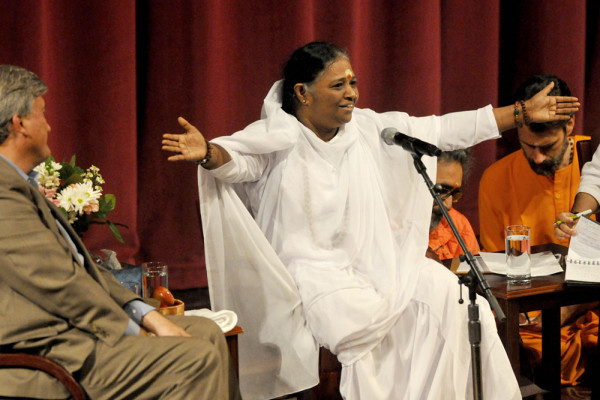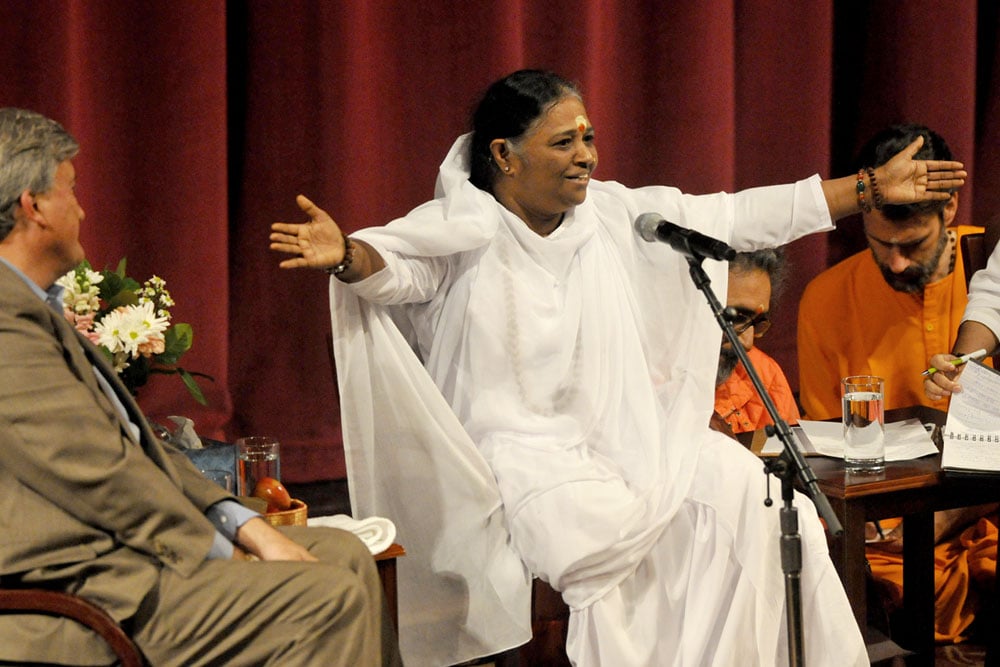
Have you ever waited over an hour in line for a hug?
Mata Amritanandamayi, better known as “Amma” (or “Mother”), has devoted her life to embracing the masses through her global charities known as “Embracing the World” and her magnetic message of love and compassion. To be more specific, Amma has physically hugged more than 33 million people.
Amma’s reputation as India’s “hugging saint” and as one of the country’s preeminent spiritual leaders explains why lines stretched outside Memorial Auditorium before her visit as people waited to embrace her.
On June 2, 60-year-old Amma shared her life experiences and insights with a packed Memorial Auditorium during her conversation with James Doty, the founder and director of Stanford’s Center for Compassion and Altruism Research and Education (CCARE).
“The main issue is that we believe we’re limited,” Amma said through her translator. “If we think we’re a battery, there’s a limited amount of time to be useful.”
Instead, Amma attributes her energy source to the “higher power and universal energy” to which we’re all connected. Although Amma is a Hindu leader, she said that her religion is love.
“There are many kinds of powers in the world — military power, power of the written word, intellectual power,” she said. “We’ve tried and failed to bring peace with these kind of powers. The greatest power is the power of love.”
With this deep belief in limitlessness, Amma has powered Embracing the World, a global network of projects focused on improving food, shelter, education, healthcare and conditions for impoverished populations in addition. The network also provides aid during emergencies and addresses environmental concerns. The vast majority of these efforts are conducted by volunteers and unpaid administrators, including Amma herself, who does not accept pay.
“This community really wants to make the world a better place and start with ourselves,” said Amina Janta, one of those volunteers who was in attendance yesterday. “I bet every last one of us is thinking ‘I can change the world.’ She gives you that self-confidence.”
This determination and resonant desire to change the world has clear connections to our community at Stanford. Through lunch conversations and summers spent nose-deep in research and the start-up culture, one can see that students and professors value this ideal of making a difference.
Annie Anton ‘14, a graduating psychology major and fellow at CCARE, has her own vision for change, one that is similarly rooted in true compassion. Anton first learned about Amma while doing volunteer work in Kerala, India, but she had already developed a conviction to give love.
“I went through a really hard time in high school,” Anton said. “I dealt with anxiety and depression. I thought, ‘Who am I and what is my purpose on this earth?’ It was all about me, how people would perceive me. All of a sudden, I saw the falsity of these goals and realized if other people are feeling this, I have to help them. It expanded my heart and made me want to help other people that might be feeling the same way.”
After graduation, Anton plans on doing service in Ecuador for seven months.
“I love that she’s a hugging mother,” Anton said of Amma. “I want to embody that motherly energy as well.”
Amma’s complete dedication to others and her message of benevolence can be profoundly contagious.
Dante Sawyer, a member of Amma’s organization who has worked with her since 2000, expressed his personal experience with this inspiration.
“In Amma, I’ve seen the full capacity of a human being to give themselves,” he said. “Sometimes you can think that the extent to which she is giving is a bit extreme — her entire life dedicated to other people — but I think it’s that extreme example that inspires other people to think, while she’s giving 100 percent, maybe I can give five percent or 10 percent or a little bit more than I’ve been giving.”
In the aftermath of Doty’s conversation with Amma, a palpable sense of compassion filled the auditorium’s space. People offered wide, toothy smiles and considerately cleared the walkways for each other.
“Compassion is the first step,” Amma said. “If we take that first step without fear, all else will follow spontaneously. It’s a chain reaction. It starts to go from one person to the next to the next, and it makes a huge difference.”
Contact Jenna Shapiro at jennshap ‘at’ stanford ‘dot’ edu.
